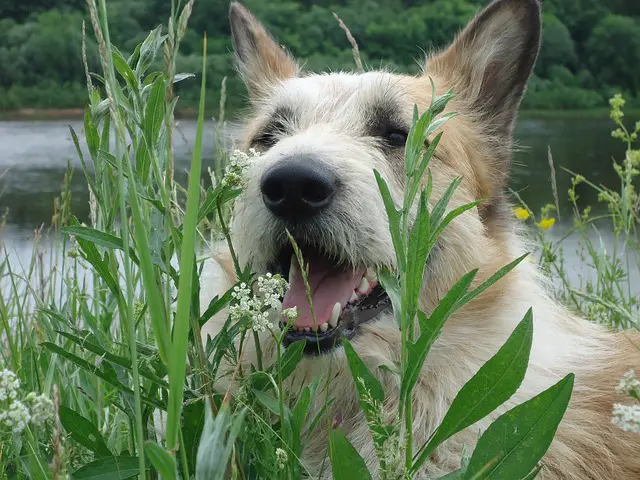Ever wondered why do dogs nibble on you?
As a pet parent, you might have thought about this time and again. Dogs do cute things and nibbling or play-biting is one of the many ones.
Many people like to think of their dog’s nibbles as love-bites; they are cute and soft and they don’t hurt.
However it won’t take long for nibbling to turn into biting if you don’t teach your dog bite inhibition. Your pet needs to understand the difference between painful bites and gentle nibbles.
Therefore, as a pet parent, you must know where to draw the line and also not confuse your dog in the process as to what is and isn’t acceptable. We tell you all about it in this guide.
Why Do Dogs Nibble on You?
Dogs nibble on you when they want attention. They might also nibble on you when they are in a playful mood or when they want some need fulfilled. Often, dogs nibble and lick human skin because of the salty sweat or due to the scent of residual food on human skin.
In the next section, we will cover in detail the various answers to why do dogs nibble on you.
Why Do Dogs Nibble on You? (6 Main Reasons)
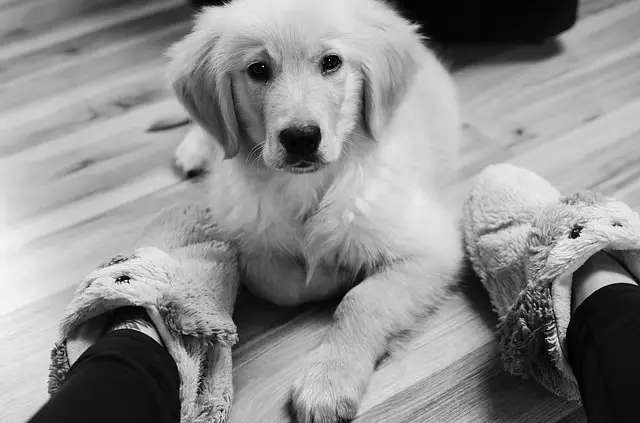
Here are some reasons why your dog might nibble on you:
1. It’s a puppy thing
Puppies do naughty things and they are still learning to behave. Pups nibble on you when they don’t have adequate toys and chew sticks.
Teething puppies will nibble on your toes, shoes, furniture, books, and sheets since their gums are irritated.
It is important that you teach your pet bite inhibition from its puppyhood so that the habit does not continue into its adulthood.
2. For attention
Dogs cannot talk so they often choose to vocalize in different ways. Nibbling on the owner’s clothing or hands or feet is a way of getting attention.
Naturally, you may want to curb the behavior since it could turn into painful bites. Dogs may not mean to hurt us intentionally but they won’t be able to control the bite pressure.
If needed, teach your dog how to use different actions or to bark on cue when it wants to go potty.
3. When they want to play
Our pooches might also accidentally nibble or bite on your skin or attire when they are in a playful mood. In a litter, dogs often pile on top of each other and even bite one another. The mother or the dam teaches the puppies all about bite inhibition.
That is why it is important that the pup stays with its littermates until it is at least 8-10 weeks of age. This will help your puppy learn that bites can be painful and also ways to control the aggression.
Even if you invite other dogs over for a play date with your dog, make sure you monitor it. It should not bite the other dog/s and you must curb the behavior from the very beginning. (We will cover ways to stop the dog’s nibbling shortly in this guide).
4. Instinctual behavior
Dog’s nibbling is also an instinctual behavior. It is completely natural for dogs to nibble on each other. Even wolves and dogs in the wild that hunt and roam in packs might playfully nibble and bite one another.
However, domestic dogs need to be trained not to bite. This is very important from your dog’s safety as well as humans’ safety around your dog.
5. To show love and affection
Until we teach our dog that particular behavior is unacceptable, it won’t understand that it has done something wrong.
As a dog owner, it is your responsibility to show your pet that nibbling may be cute but it isn’t acceptable. Your dog might think it is trying to show its love and affection through its nibbles but we must correct the behavior right away.
6. They love the salty taste of human skin
Many dogs will nibble on your skin because of its taste. You might be sweaty after workout and your pet might come over and give those love-bites. Sometimes, you may have eaten something and the food’s taste and scent might still linger on your hands and mouth. A dog might nibble your skin simply to taste what’s on it.
Also Read: Why Do Dogs Jump on You and Bite
Should You Encourage your Dog’s Nibbling?
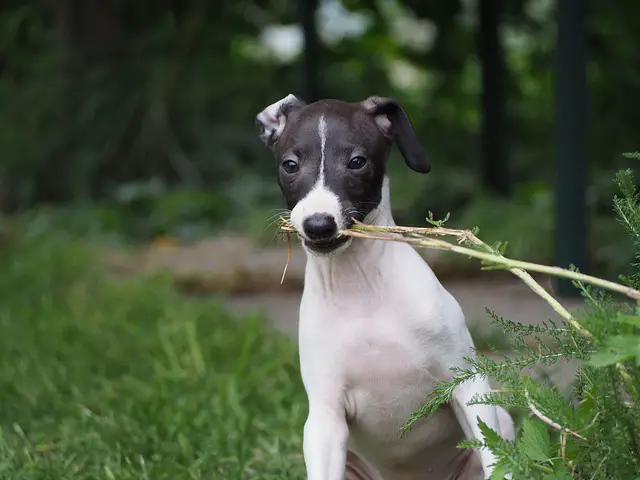
As a dog parent, you might be 100% confident that your pet means no harm when it gives those ‘love bites’.
You might even have multiple house pets and the dog might even bite the other dogs playfully. The bites do not tear your skin and you find them cute and affection.
However, you must not encourage the behavior for the following reasons:
1. Can turn into aggression
Dogs that do not learn bite inhibition in puppyhood are more likely to bite when they become adults. Moreover, your pet might also start resorting to other signs of aggression such as growling, snapping, and snarling.
It won’t take too long for your fur baby to think that it is alright if it shows these behaviors. That is why, it is important to not let the nibbling take root as a habit.
Remember: it is easier to correct a puppy than it is to correct an older dog.
2. Dog bite psi
A dog’s bite psi is the measure of the force of its bite. Even small dogs like Chihuahuas can have a bite psi of 100. PSI stands for pounds per square inch. 100 psi is fairly strong and can tear the skin easily.
PSI of a dog’s bite depends on the dog’s mouth size and jaws. Based on the dog breed you own, you can even expect higher bite psi such as:
- German shepherd – 238 psi
- Doberman – 229 psi
- Chow chow – 220 psi.
- Pit bull – 235 psi
Hence, you may want to curb the mouthing behavior of these puppies from a young age as older dog would have even higher bite force.
How To Stop Your Dog From Nibbling on You?
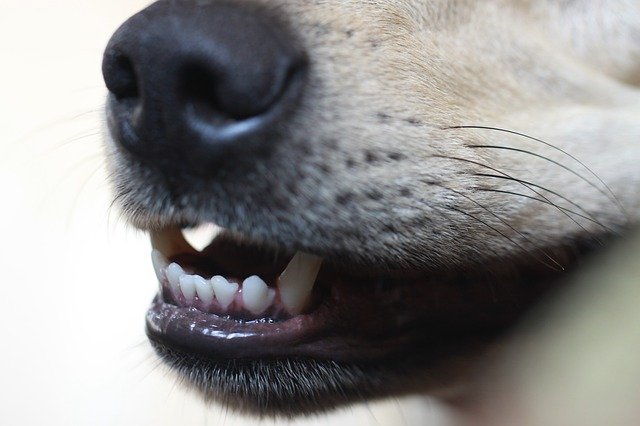
Here are some steps, tips, and tricks to prevent your dog from nibbling on you or even other dogs during playtime:
1. Teach bite inhibition from puppyhood
As soon as you bring your puppy home, start its training. The training should include basic training like potty training, basic obedience, and even bite inhibition. If your pet is about 8 weeks old, chances are that its dam might have taught it some basic bite inhibition.
However, once your puppy’s teething phase starts, you must again continue the bite inhibition training. Here are the steps:
- Play with your puppy. If it nibbles or bites you, yelp loudly. Stop play immediately and turn away. Ignore your puppy.
- After a few minutes, continue playing, and if it bites, again yelp, say NO biting, and turn away.
- You can even crate your puppy or walk out of the room and ignore it.
- Your pup will soon understand that its playful mouthing is not fun and that it puts a stop to the play and fun time.
- Continue this for as long as your puppy nipping and mouthy behavior does not stop.
2. Provide it with plenty of chew toys
Put a stop to your dog’s nibbling by providing plenty of chew toy, dental sticks, rope toys etc. Play tug of war with rope toys fashioned out of old T-shirts.
This will help soothe irritated gums and your dog won’t feel the need to show any dog mouthing affection.
3. Use positive reinforcement
Avoid negative methods of training like hitting, rubbing your dog’s nose in its urine etc. These methods can encourage aggressive behavior.
Instead, use positive reinforcement like praising your pet for urinating in the designated spot, or when it shows affection by snuggling close to you. These methods will prevent aggressive behavior, shyness, etc.
4. Use taste deterrent
In some cases, it can help using taste deterrent like bitter sprays. You can spray these on your skin and clothes to prevent mouthy behavior in young dogs. These bitter sprays are natural and completely safe and can eliminate play biting in pups.
5. Muzzle your dog
As a last resort, it can help muzzling your dog. This will prevent dangerous bites and especially keep other dogs and humans safe. Always discuss this with a dog trainer or your vet before using this method.
6. Use a head halter at dog parks
When you take your pet to the dog park, use a head halter. This will prevent your pet from biting other dogs and humans. It is a humane way of training your dog to walk quietly on lead without barking or lunging at other dogs.
Should You Bite Your Dog Back?
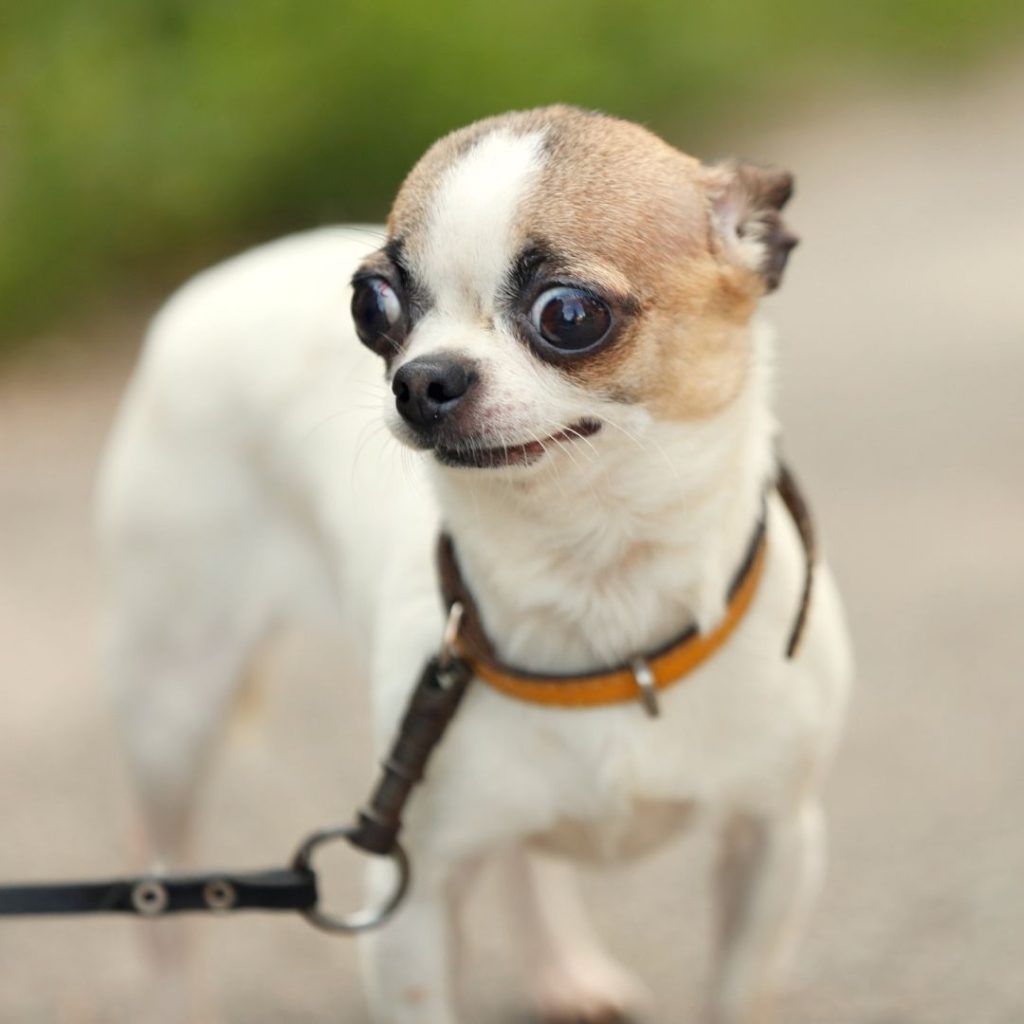
In the past, dog trainers would recommend methods like rubbing your dog’s nose in their indoor urine, biting the dog back and snarling, growling, or showing aggression to the pet when it did the same.
Today, such methods are considered outdated for the simple reason that they may or may not work. Some of these techniques can also put you at risk.
For example, growling back at your dog when it growls at you could invite it to bite you. So, please use only positive reinforcement: praise and reward your dog for the behavior you want it to show and ignore the behavior you don’t want it to show.
Play biting your dog won’t work for the same reason. Instead, ignore your pet when it bites you or yelp loudly. Then walk away and stop the petting, treating, playing, etc.
Your dog will soon understand that this nibbling behavior is not conducive to fun and play time.
What Happens if a Dog Lightly Bites You?
If an unknown dog lightly bites you, make sure that it is vaccinated. Check the same with its owner.
If the owner isn’t around, it is best to get yourself examined by a doctor. If the bite or scratch has punctured your skin, you might need a tetanus shot. If the dog is not vaccinated, it could help if you get an anti-rabies shot.
If your own dog lightly bites you, wash the skin and apply antiseptic lotion or cream. Your pet must be up-to-date with its vaccinations so you won’t need any injections.
If your skin starts oozing pus or swells up, you might need some antibiotics to deal with the infection.
Which Dog Breeds are Notorious for Biting?
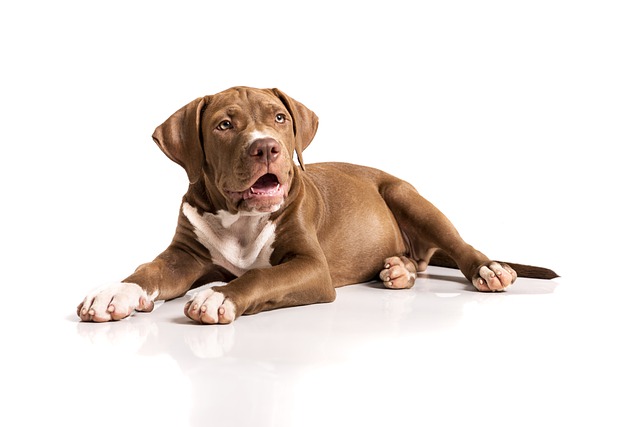
Any dog can bite. Even a gentle dog could snap and turn violent if it is provoked or when it is sick.
In general, the following dog breeds are notorious for biting humans:
- Pit bull
- Chihuahua
- Cocker Spaniel
- Rottweiler
- German Shepherd
- Tosa Inu
- Doberman Pinscher
- Bull mastiff
How to Show Dominance to Your Dog?
Every dog owner must show that he is the alpha to his/her dog/s. Here are some steps:
1. Take your pet for walks but always lead
During walks, do not allow your dog to lead the way. Make it heel by your side.
2. You eat before the dog eats
Never offer food to your pet first before you eat.
3. Do not let it walk before you
A dog that enters or exits through doorways can start thinking it is the alpha. Show it who the boss is!
4. Do not let is sprawl in the path
Never step over or go around your dog. Instead show it straight away that it isn’t acceptable to stay sprawled in the path.
Conclusion
Why do dogs nibble on you?
Dogs nibble on their dog owners when they want attention, for showing affection, or simply when they want a need met. Sometimes, they might nibble on you to taste your sweat or some food scent left on your skin.
You must nip your dog’s nibbling behavior or it could escalate out of control. We hope this guide helps you do that!
